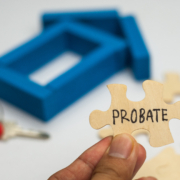Key Steps Of The Probate Process
Dealing with the death of a loved one is never easy – and handling the emotional upset is difficult enough without having to tackle the tax and legal aspects involved in the probate process.
However, probate needn’t be such a daunting task to the personal representatives (PRs), also known as executors when appointed in a Will, when approached in the right way – as there are some key steps to take which help to ensure the process is more straightforward.
The Probate Process: Key Steps
Funeral Arrangements
As a personal representative or executor, you need to establish if your loved one left any instructions for what should happen after they die, such as burial or cremation or organ donation. This information will help you with the funeral arrangements.
Death Registration
You need to register the death within 5 days with the UK authorities. This is now done either on line or by telephone. When registering the death it is useful to opt for the “Tell All Once” system which notifies certain other authorities automatically.
Estate Assessment
It’s worth having an overview of the estate as soon as possible. Check the details in the Will, if there is one, to establish the beneficiaries and what they’re entitled to receive. Also check if your loved one was involved with or had any trusts as you need to make sure any trustees are notified of their death.
Try to identify any potential issues with the handling of the estate. For example, is the Will legally watertight? Are there likely to be any potential claims made against the estate from those who relied on the deceased but haven’t been included in the Will?
By assessing the estate straightaway, you can seek legal advice early on if needed.
It’s worth noting that personal representatives are personally liable to the deceased’s creditors even after the estate has been distributed. However, you can protect yourself by placing so-called Trustee Act Notices which alert creditors in the London Gazette and in a newspaper local to where your loved one lived.
Estate Valuation
You need to establish the assets and liabilities of your loved one. Depending on the estate, you may need to have assets valued and you’ll also need to find out any liabilities such as loans or overdrafts as you’ll need this information to establish whether or not inheritance tax needs to be paid.
Inheritance Tax Return
You need to prepare the inheritance tax (IHT) return to inform HMRC of the estate’s value.
There are 2 types of IHT returns, depending on the value and complexity of the estate:
- IHT205
This return is for less complex estates and should be sent straight to the Probate Registry. This form is now only required for deaths that occurred prior to 2022. - IHT400
This return is for more complicated estates and the form should be sent to HMRC and once payment is made HMRC will issue with a stamped receipt called the IHT421 directly to the Probate Registry.
As part of the preparations, you need to calculate the IHT due and this needs to be paid by the end of the sixth month after your loved one’s death, otherwise interest will start to build. For certain assets like property, there is the option to pay IHT in instalments over 10 years or before then if the asset is sold, with interest building on the remaining balance until it is paid.
20 working days after submission of any required IHT return, you can submit your application for a grant of probate or letters of administration to the Probate Registry.
If any assets are only found after the IHT return is made, it is important to inform HMRC straightaway and to pay any extra IHT and interest.
Grant of Representation
Once the IHT return has been submitted, you need to prepare the application for the grant of probate or letters of administration. This document confirms that you as the PR (and any other PRs there may be) have the authority to deal with the deceased’s estate, granting permission for you to collect the assets, pay the liabilities, and distribute the remainder according to the deceased’s Will or rules of intestacy if there isn’t a Will.
The probate court will then issue a grant.
The two main types of grants are:
- Grant of probate, if the deceased had a Will
- Grant of letters of administration, if the deceased had no Will
To obtain a grant of probate, the original Will needs to be sent to the Probate Registry together with the grant application and the Will is then kept by the court.
As a personal representative or executor named in a Will, you have the choice to accept the responsibility of dealing with the estate as there is no legal obligation to do so, provided that you make the decision before becoming involved at all.
If a PR or executor does not want to proceed, they have two options open to them:
- To reserve their power to act as executor
There will be no requirement to act straightaway but they could make an application for a second grant in the future to become an acting executor. - To renounce their power to act as executor
This involves fully giving up their power to be executor with no option to reverse their decision in the future.
Estate Administration
Once the grant has been issued, you as the personal representative or executor have the authority and duty to handle the estate and its distribution.
As a guide, this will include carrying out the following:
- Paying off all estate debts
- Keeping estate accounts to show the money received into and paid out of the estate, and the assets transferred to beneficiaries
- Completing the estate tax returns, reporting the income and capital gains made during the administration period
- Distributing cash or assets to the beneficiaries
Helping You with the Probate Process
Every estate is unique and handling the administration of an estate varies in complexity. Probate can be straightforward but the process can also be challenging and require extensive legal knowledge of this particular area of law – our probate specialist solicitors have experience of dealing with the most complex estates and are here to help you at every step of the probate process.
We will guide and support you throughout the process, helping with the estate administration as needed and working hard to make the probate process as straightforward and stress-free as possible for you during this difficult time.






